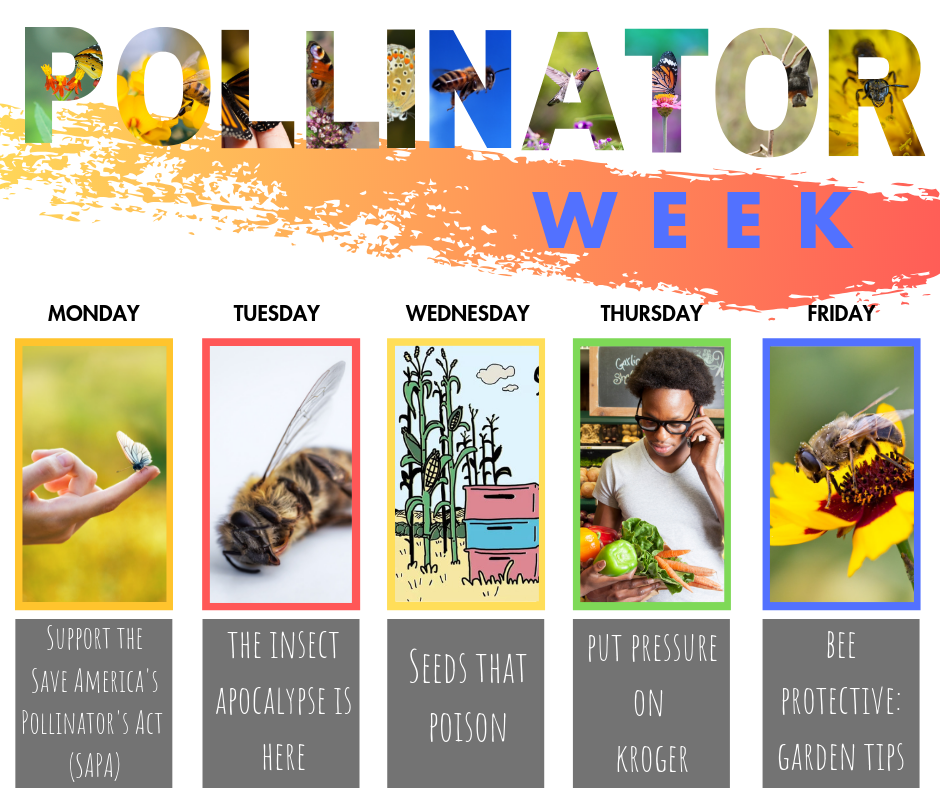14
Jun
Gear Up for Actions to Protect Pollinators during Pollinator Week, June 17 – 22

(Beyond Pesticides, June 14, 2019) Next week, June 17–22, marks Pollinator Week 2019, a celebration of the beauty and benefits these critical species provide, but also a call to action to protect pollinators and the natural world. Since United States Senate declared the first Pollinator Week in 2007, nearly every week since there has been new research published linking pesticides to pollinator declines. Yet the companies that produce pollinator-toxic pesticides, like Bayer and Syngenta, make use of this week to excuse their products from any culpability. Instead, they sponsor events and posters, discussing every threat to bees except those posed by the pesticides that make up their bottom line.
They are the villains in this story, but there is no superhero in line to save bees, butterflies, birds, and bats. That’s why it’s up to you, everyday heroes that support protecting pollinators, to alert the public, and inspire good in elected officials.
We’ve outlined a week of actions aimed at educating and inspiring action to protect pollinators.
Monday
Support the New Saving America’s Pollinators Act (SAPA), HR1337. SAPA represents the best opportunity to enact meaningful changes at the federal level that will protect pollinators in the long term. This bill, reintroduced by Representatives Earl Blumenauer (D-OR) and Jim McGovern (D-MA), would immediately cancel pollinator-toxic pesticides and institute a Pollinator Protection Board of experts to review other pesticides for their toxicity to pollinators. On Monday, help us raise awareness of this legislation and inspire your Congressional Representative to add to the current list of 53 cosponsors.
Tuesday
The Insect Apocalypse and the Magnitude of the Current Crisis. It’s not just pollinators that are in decline. More and more studies are showing that the entire insect world is under at global catastrophic risk. However, the root causes of these emergencies all relate to the global spread of industrial agriculture and its operations to displace and/or poison habitat, whether directly through the destruction of wild lands for farming, or the application of pesticides, or indirectly through their contributions to climate change. On Tuesday, help us fight back against totalitarian agricultural practices that place profit above the natural world.
Wednesday
Watch and Share the short film, “Seeds that Poison.” The majority of corn, soybeans, and other food crop seeds are coated with toxic pesticides. Many seeds and flowers marketed as “bee-friendly” at garden centers are also contaminated with systemic chemicals. These pesticides emerge from the seed through the plant, and invade soil biology and surrounding waterways, causing indiscriminate poisoning and contamination. On Wednesday, share this video with your friends, neighbors, and community, and encourage them to purchase organic, uncoated seeds in their yards and gardens.
Thursday
Protect Pollinators in the Marketplace. Groceries sold in supermarkets like Harris Teeter, Fred Meyer, King Soopers, and other Kroger-owned stores can contain pollinator-toxic pesticides. Kroger has the ability to eliminate these highly toxic chemicals in the food products it sells, but it has so far refused to do so. On Thursday, we’ll be asking Kroger customers to visit their local stores and deliver a letter urging them to remove highly toxic pesticides from its supply chain and provide more affordable, organic options.
Friday
Promote organic, pesticide free zones and join the #ProtectPollinators twitter chat. To save pollinators, we need a positive vision for the future of food production and pest management. Organic agriculture and land management is a necessary part of that future – and every individual can do something in their own yard or community towards that effort. Show the world you’re protecting pollinators and model what’s possible without pesticides by placing a marker on the Pesticide Free Zone Map. Take the Pesticide Free Zone Survey, and upload a picture of your pollinator friendly, pesticide-free lawn, yard, or garden.
We’ll also be joining allies in a #ProtectPollinators twitter chat on Friday, June 21 at 12pm to call out industry malfeasance, and spread the word about the important efforts going on throughout the country – at the local, state, and federal level, to truly #protectpollinators.
Thank you to all who can engage in these efforts and be a pollinator hero this pollinator week. Stay tuned for more updates throughout next week!
All unattributed positions and opinions in this piece are those of Beyond Pesticides.










